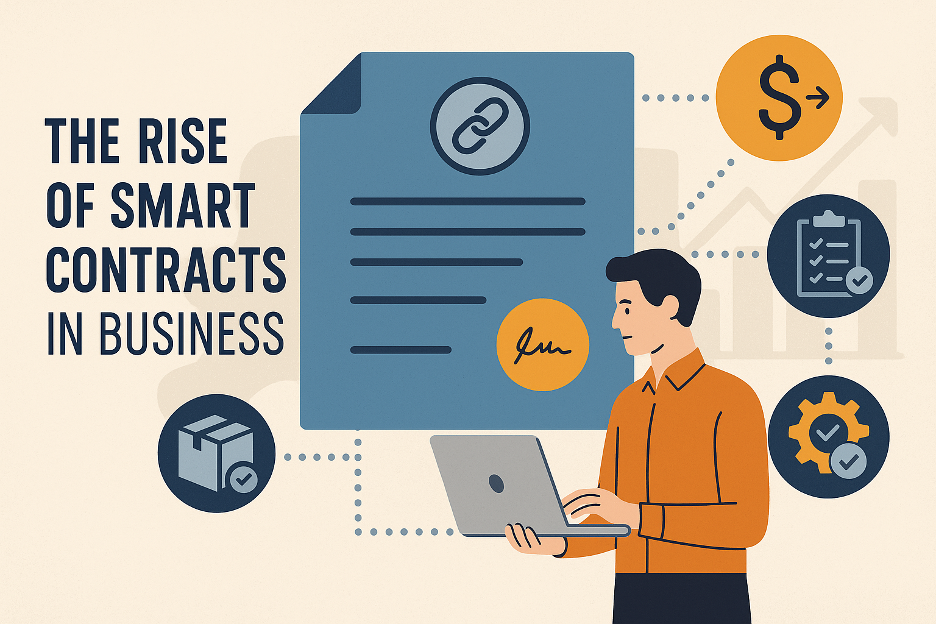Resources
The Rise of Smart Contracts in Business

Ever wondered how a simple piece of code could seal a multimillion-dollar deal without lawyers or banks? That’s the magic of smart contracts in action. Back in 2015, Ethereum introduced them as self-executing agreements stored on the blockchain. Fast-forward to 2025, and they’re everywhere, automating everything from payments to supply chains.
Smart contracts work like vending machines. You input conditions, and they deliver results automatically when met. No trust issues, no delays. The global smart contracts market hits $3.69 billion this year, up from previous highs. Businesses love them for cutting costs and boosting efficiency.
As a trader who’s seen the crypto world evolve, I’ve watched smart contracts turn speculative tech into business essentials. They’re not just for tech geeks anymore. This article dives into their impact on finance, logistics, and management. Let’s see how they’re reshaping operations.
Smart Contracts in Finance and DeFi
Finance leads the charge in smart contract adoption. Traditional deals drag with paperwork and intermediaries. Smart contracts streamline it all via code.
Take Aave. It offers flash loans where you borrow huge sums instantly, as long as you repay in the same transaction. No credit checks needed. Chainlink provides real-time data feeds, ensuring contracts react to market prices accurately.
DeFi, powered by these contracts, manages over $200 billion in total value locked as of September 2025. That’s a massive jump, driven by platforms like Uniswap for automated trading.
In my trading days, I used smart contracts to hedge positions overnight. They execute flawlessly, reducing human error. Consider the $100 ETH investment scenario. If you stake it in a DeFi protocol via smart contract, yields could compound automatically, turning small sums into steady gains.
But hacks remain a risk. The Poly Network breach in 2021 taught us about audits. Today, insurance like Nexus Mutual covers losses.
Adoption soars because costs drop up to 70% in processes like settlements. Institutions are jumping in, blending smart contracts with traditional finance.
Here’s a quick comparison:
| Aspect | Traditional Finance | Smart Contracts |
| Deal Speed | Hours to days | Seconds to minutes |
| Cost | High (2-10%) | Low (<1%) |
| Transparency | Limited | Full blockchain |
| Trust Required | Intermediaries | Code-based |
| Accessibility | Banks needed | Internet wallet |
This shift makes finance more inclusive, especially for unbanked regions.
Smart Contracts in Logistics and Supply Chains
Logistics gets messy with tracking and disputes. Smart contracts fix that by automating triggers based on real-world events.
IBM’s TradeLens platform uses them to track containers globally. When a shipment arrives, payment releases automatically via integrated IoT sensors. Walmart employs smart contracts for food safety, tracing produce from farm to shelf in seconds.
The blockchain supply chain market reaches $3.27 billion in 2025, reflecting rapid growth. Errors drop by 30%, and processes speed up 40%.
I’ve analyzed supply chains in macro trading. Smart contracts cut delays in volatile commodity markets. For instance, a coffee exporter verifies quality and pays suppliers instantly upon delivery confirmation.
Challenges include integrating with old systems. High upfront costs deter some, but ROI comes quick through efficiency.
Looking forward, IoT integration will make tracking even smarter. Industries like pharma benefit from tamper-proof records, ensuring drug authenticity.
This tech isn’t futuristic. It’s here, reducing fraud and building trust in global trade.
Smart Contracts in Management and Legal Processes
Management and legal work thrive on agreements. Smart contracts digitize them, making enforcement automatic.
Aragon helps create DAOs, where decisions happen via token votes coded into contracts. OpenLaw turns legal docs into executable code, simplifying contracts.
DAOs now hold about $21.4 billion in assets collectively in 2025. That’s community power at scale.
In business, they handle everything from payroll to governance. Gitcoin uses smart contracts for funding open-source projects, matching donations transparently.
From my perspective, DAOs reshape corporate structures. They distribute power, making decisions faster than board meetings.
Legal hurdles exist, like token classification. Regulators are clarifying, but privacy tech like zero-knowledge proofs helps.
Socially, smart contracts aid charity. Funds release only when milestones hit, ensuring accountability.
Overall, they cut legal fees and build trust through code.
Conclusion
Smart contracts have risen from niche tech to business staples. In finance, they power DeFi’s billions. Logistics gains efficiency and transparency. Management becomes decentralized and fair.
By 2030, expect them in 20% of business processes, fueled by AI and cross-chain tech. The market could hit $815 billion by 2034. Adoption hits 560 million users globally this year.
Risks like security need vigilance, but benefits dominate. As Vitalik Buterin says, they’re about trust minimized.
For businesses, start small. Pilot a smart contract for payments or tracking. It could transform your operations. The future is coded, and it’s exciting.

-

 Resources4 years ago
Resources4 years agoWhy Companies Must Adopt Digital Documents
-

 Resources3 years ago
Resources3 years agoA Guide to Pickleball: The Latest, Greatest Sport You Might Not Know, But Should!
-

 Resources7 months ago
Resources7 months ago50 Best AI Free Tools in 2025 (Tried & Tested)
-

 Guides2 years ago
Guides2 years agoGuest Posts: Everything You Should Know About Publishing It

